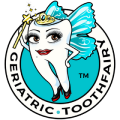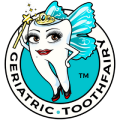Every time I step into a nursing home or senior community, I cannot help but notice a pattern that troubles me deeply: toothbrushes still wrapped in plastic, dentures sitting dry in cups, and caregivers rushing from task to task without a moment to stop for oral care.
Our seniors deserve better and more. Oral health is not cosmetic—it’s connected to heart disease, diabetes, pneumonia, and quality of life. The World Health Organization and CDC both remind us that poor oral health in older adults is a public health crisis, but it often goes unnoticed.
This is not just a professional issue for me. It’s deeply personal. When my grandmother lost most of her teeth, I still remember her struggle to eat, to smile confidently, and to connect socially. That memory fuels my mission as The Geriatric Toothfairy: to ensure no senior has to live without dignity because of neglected oral health.
For ourselves and our families, we must do better. And it begins with one crucial step—educating caregivers.
Table of Contents
ToggleWhy Caregiver Education Matters
Caregivers are the backbone of senior health. They are in the room when seniors wake up, when they eat, and when they go to bed. They notice discomfort, manage medications, and help with daily routines. However, many caregivers—both family members and professionals—have never received formal training in senior oral care.
Without that training,
- Dentures may not be cleaned daily, leading to painful fungal infections.
- Caregivers may not recognize xerostomia, the clinical term for dry mouth caused by medications, which makes teeth more prone to decay.
- Inflamed gums may go unnoticed until infection spreads, causing systemic health problems.
- Seniors with dementia may resist brushing, leaving caregivers unsure how to respond without causing distress.
The gap is not intentional—it’s systemic. Caregivers are often stretched thin, underpaid, and undersupported. Many facilities don’t prioritize oral care because it’s considered “secondary” compared to medications or wound care. But we know better. When oral health fails, overall health fails.
We can transform this picture by equipping caregivers with practical tools, empathy-based training, and ongoing support. We can reduce hospitalizations, prevent unnecessary pain, and bring back dignity.
5 Steps to Educate Caregivers on Senior Oral Care
1. Make Training Practical and Hands-On
People learn best when they can see, touch, and practice. That’s why oral care training must go beyond lectures.
In my training, I bring real toothbrushes, denture models, gloves, and mouth mirrors. I let caregivers practice brushing on models, holding dentures correctly, and positioning patients for safe care. When they practice, they build muscle memory.
For example, a caregiver once told me she avoided brushing a resident’s teeth because he always bit down on the brush. After practicing with me, she learned to gently angle the brush from the side and use a soft verbal cue to encourage cooperation. She then had the confidence—and so did her resident.
Key areas to practice:
- Safe positioning of seniors, especially those in wheelchairs or bed-bound.
- How to clean dentures with mild soap, never hot water (which warps them).
- Correct brushing angles to reach the gum lines without causing bleeding.
- Handling resistance with calm, patient-centered techniques.
When caregivers experience success in practice, they are far more likely to follow through in real life.
2. Provide Clear, Simple Resources
Caregivers are busy. They juggle meals, medications, mobility, bathing, and more. They need tools that are quick, clear, and always within reach.
That means education should not live in a binder on a dusty shelf. Instead, we need:
- Checklists taped inside bathroom cabinets with step-by-step oral care routines.
- Laminated cards that list warning signs like sores, swelling, or loose dentures that require a dental referral.
- Short videos accessible on smartphones, showing how to brush, clean dentures, or calm a resistant senior.
- Daily logs where caregivers record whether brushing and denture cleaning were completed.
One facility I worked with placed laminated “Oral Care Quick Tips” at every sink in the building. Within weeks, compliance with oral care routines improved by 40%. That is the power of clear reminders.
Simple, accessible tools reduce confusion and make oral care feel doable, not overwhelming.
3. Connect Oral Care to Whole-Body Health
Caregivers often see brushing as “just teeth.” That is why it is so important to connect oral health with total health.
Explain that:
- Gum disease can make diabetes harder to control because inflammation affects blood sugar levels.
- Bacteria from untreated oral infections can travel to the lungs, triggering pneumonia—the second most common infection in nursing homes.
- Tooth pain or poorly fitting dentures can lead to weight loss, malnutrition, and even depression.
When caregivers realize that brushing and denture care can prevent hospital visits or life-threatening illness, they shift their mindset. They begin to see oral care as part of essential caregiving—just as important as giving medication.
In one training, I asked caregivers to share stories of residents they had lost to pneumonia. Then I explained how oral bacteria often play a role in those infections. You could see the light bulbs go off. They suddenly understood that a toothbrush could save a life.
4. Address the Emotional Side of Care
Senior oral care is not just clinical—it is emotional. Many older adults resist brushing or denture cleaning because of embarrassment, discomfort, or confusion. This is especially true for those living with Alzheimer’s or dementia.
Caregivers need strategies to handle resistance with dignity:
- Approach with respect. Make eye contact, explain what you’re doing, and always ask for permission.
- Go slow. Rushing increases resistance. Take breaks if needed.
- Use distraction. Play calming music, hold their hand, or let them hum a familiar tune.
- Celebrate cooperation. A smile, a thank-you, or a gentle touch reinforces positive experiences.
I once worked with a caregiver who struggled with a resident who refused oral care daily. We tried singing the resident’s favorite church hymn together during brushing. To our surprise, the resident relaxed and even smiled. The caregiver left with a new tool, and that resident regained their dignity.
Caregiving is not just about teeth—it’s about trust. And trust must be taught, modeled, and reinforced.
5. Create Accountability and Support Systems
Training alone is not enough. Caregivers need ongoing accountability, encouragement, and reinforcement.
That means:
- Supervisors should check oral care logs during shift reports.
- Families should ask about brushing routines during visits and advocate when it’s being skipped.
- Dental professionals should provide quarterly refresher trainings to keep oral health in mind.
- Facilities should include oral care in performance evaluations and quality audits.
One facility I partnered with began rewarding caregivers with recognition when residents’ oral health improved. The result? Caregivers felt proud, residents were healthier, and families felt more confident in the care being provided.
Oral care becomes part of the culture when accountability is built in. It’s no longer optional—it’s expected, celebrated, and sustained.
For Ourselves and Our Families
At the core of this work is one shared value: dignity.
Neglecting oral care strips seniors of comfort, safety, and self-worth. Prioritizing it restores those things. Clean teeth and dentures mean easier eating, better speech, fresher breath, fewer infections, and more smiles.
Think of the families who trust us to care for their loved ones. Think of our own parents and grandparents. And yes, think of ourselves. One day, we may be the ones in the chair, relying on someone else to brush our teeth. Wouldn’t we want them to care enough to do it well?
This is about dignity. This is about safety. This is about love—for ourselves and our families.
If you are a dentist, hygienist, caregiver, or policy advocate, the responsibility is clear. We must make geriatric oral care education a standard in every facility, every home, and every community.
📘 Download my Caregiver Oral Care Checklist to start making immediate improvements.
🎓 Enroll in my Geriatric Oral Health Certification program to deepen your expertise.
🎤 It would be great to speak at your facility or event to train your team and inspire your caregivers.
Together, we can equip caregivers with the tools, knowledge, and compassion they need to safeguard oral health. Let’s make senior oral care a priority—for ourselves and our families.


